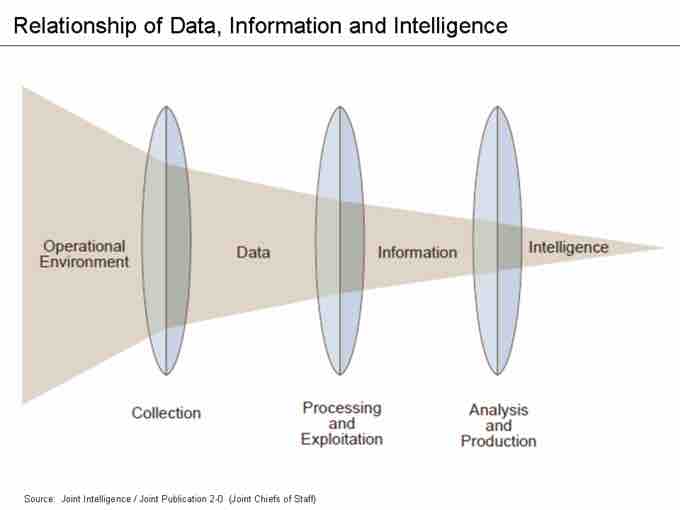Defining Analytics
The derivation, interpretation, and expression of patterns within data sets is referred to as analytics. This broad definition can fit numerous contexts, and is highly relevant in virtually every modern field of business and science. There are many instances in a business environment where analytical thinking skills are applied to produce meaningful observations. In fields from marketing to operations to finance to strategic decision-making, managers must both understand and employ analytical skills to succeed in the modern business environment.

Analyzing the Operational Environment
This image shows how information from the operational environment translates into meaningful data, information and ultimately intelligence for decision-making.
How to be Analytical
Strong analytical skills are as much a developed competency as they are a perspective. Pursuing objective, fact-based decision-making and data-driven conclusions requires a commitment to an analytical mentality. Pushing gut feelings and intuition into the background in favor of framing issues through analysis is a constant struggle in nearly every organization. It is a critical role of management to ask the right questions and align employee behavior with analytical thinking.
Depending on the particular role, industry, organization and objectives, a manager may use one or more of the following analytical models to frame tactical and strategic questions:
- Decision analytics – Using data-driven models and visualizing outcomes of specific organizational behaviors can enable managers to visualize the various outcomes of different strategic approaches.
- Descriptive analytics – Collecting historical data from reporting, scorecards, clustering and various other sources of information, managers can underline trends and identify opportunities and/or risks.
- Predictive analytics – Leveraging statistical models and machine learning, managers can predict future outcomes with varying degrees of statistical confidence.
- Prescriptive analytics – Using optimization and simulation, managers can produce recommended decisions through analytical modeling.
Domains of Analytics
- Behavioral analytics
- Cohort Analysis
- Contextual data modeling
- Enterprise Optimization
- Financial services analytics
- Marketing analytics
- Pricing analytics
- Retail sales analytics
- Risk & Credit analytics
- Supply Chain analytics
- Talent analytics
- Transportation analytics
- Customer Analytics
More Important Now Than Ever
In the current technological environment of big data, analytics has never been more relevant and central to the organization. With endless data available, it is easier than ever to derive advantage or make substantial mistakes in digesting this data. Indeed, utilizing analytics incorrectly can be just as disastrous as not using it at all! In a world with this much data, maintaining objectivity and refraining from cherry-picking to prove one's opinion is a very important skill.
Managers must be owners not only of the decisions they make, but the validity of the process in which they make them. Analytics is the core skill set required for success in this domain, arguably the most important facet of management.